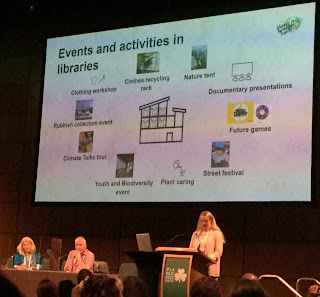The last formal session I attended at WLIC in Dublin was Climate Action in Libraries: Creating a More Sustainable Future by Engaging and Inspiring Youth, organised by the IFLA Environment, Sustainability and Libraries Section, Libraries for Children and Young Adults Section. There were six short talks
1. The Libraries Inspiring Young People toward Sustainable Futures: A Danish Example from Søren Dahl Mortensen, Odense Central Library, Denmark. The focus of their project was sustainability and also new ways of lending. They decided to make recycling kits for lending out, asking young people about what should be in the kit. The first is a DIY kit has tools and guides useful for when you move away frm home e.g. drill, tool box, instructions so people can do practical things like put up pictures and shelves. The 2nd is a Party Kit with popcorn/candyfloss machine, lights etc. There is also an Outdoor kit, a food/gastronomy kit and a Scrap Sculpture kit. There were discussions abut whether these were things for libraries to do, but the answer is, yes they are!
2. Coatian Libraries Engaging Youth in Sustainable Practices from Alica Kolaric, University of Zadar, Croatia . The speaker identified that there were lots of library initiatives and she highlighted some of them. (1) "we sow and plant" sowing and monitoring growth of plants (2) Celebration of World Bee Day (3) Children learning about local meadow plants (planting some more bee-friendly plants) and bees (4) Creating a picture book with stories from local folk tales and ecological messages (5) Making a wooden composter (6) Ecologically themed puppet show (7) Stribor Forest project, an instructive trail - the library collaborating with a local hiking group (8) Book shelves aith ecologically themed books (9) Lavender days - children harvesting this local crop and making lavender bags etc. in the library (10) Eco themed storytelling (11) Green library project in Zagreb with exhibitions, walks etc.
3. Training for Teachers and Librarians About Sustainability Through Picture Books and Comics. An Example from the Bibliothéque Nationale de France (BnF) from Emilie Bettega, Bibliothèque Nationale de France, France. She provided a full text paper here https://repository.ifla.org/handle/123456789/1998 She highlighted that the new Bibliothéque Nationale building contains in the middle an urban forest with cute animals! There is a reading room for sustainable development and also a section of the website devoted to sustainable development. They collaborate with the EAC on training teachers about how to use picture books and comics in sustainability education. Also they collaborated with Cite des sciences et industrie, and a key part of this was enabling teachers to help pupils create their own comics, learning how to use an app that supports creation of comics. This led in turn to the idea of having training for librarians.
4. Youth and Environmental Emotions Project – Public Libraries Supporting Youth to Treat and Express Their Emotions and Views Concerning Environmental Issues from Veera Visuri, Helsinki City Library, Finland. There also is a paper for this https://repository.ifla.org/handle/123456789/1957. This started from the fact that young people are experiencing climate anxiety and thinking about the role of public libraries in countering this anxiety. The project involved libraries in 4 cities: main target groups were people aged 13-20 an also librarians (who can continue the work). They carried out a survey to get the young people's own ideas. There were lots different ideas (see the picture above) in libraries, some also in schools and youth centres. They also used social media e.g. TikEok, Instagram, Youtube etc. on themes such as tips, environmental feelings. They had campaigns which solicited questions and then experts answered them in videos. Providing the information, events etc. where the young people were situated was important (physical and virtual places). They are publishing a practical guide to events and activities, to support people organising these.
5. Tales, Videos, Games and Environmental Education to Engage Children and Young Adults: Looking for Funny Approaches to get Involved With SDGs from RECIDA (Spain) from Rosario Toril Moreno, National Centre of Environmental Education, National Parks Autonomous Agency, Ministry for the Ecological Transition and the Demographic Challenge, Spain (coauthored with her collagues). There is a full text paper here https://repository.ifla.org/handle/123456789/1962. RECIDA is a network of green libraries with working groups for different projects. Their website is http://www.recida.net and they participate in a lot of social media platforms. They loan collections, suitcases with different materials in them, have mobile libraries and run things like environmental storytelling. They have incorporated SDGs into readings that teachers can use, and create videos e.g. on how to take care of animals and the forest. They have created games e.g. SDG escape room. They encourage young people to carry out investigations and activities e.g. creating gardens, monitoring air quality.
6. Green Initiatives Towards a Sustainable Future: Insights From Libraries in Kenya from Arnold Mwanzu, Aga Khan University, Kenya. His paper is here https://repository.ifla.org/handle/123456789/1956. As not much was known what was being done in Kenyan libraries to address these green issues, they did some research. They used interviews, observation and document review and looked at libraries in a variety of sectors. May librarians were not familiar with the concept of green libraries, but in fact they were carrying out green library practices. Examples are rain harvesting, using natural lighting, tree planting inside the library (all had planting either or inside the library, and sometimes students were involved), discouraging printing and generally using less paper, using solar energy. Young people are involved in greening events (e.g. collaborating with a school on tree planting). They propose more involvement of young people, having performance evaluation for the green aspect of libraries and maintaining the green library standards.

No comments:
Post a Comment